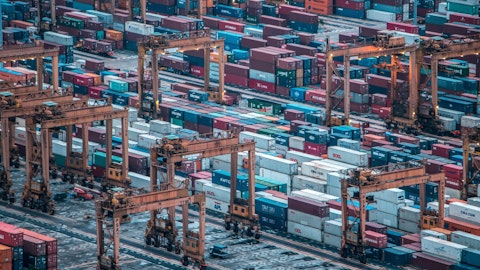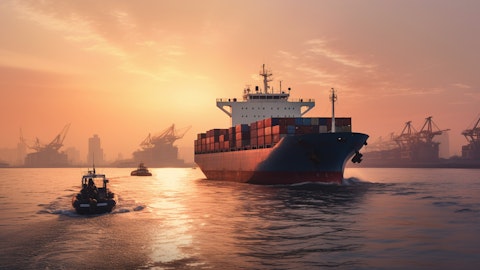Nicos Rescos: Yes. I think we value the fact that you can’t get it wrong if it ends up depending on cash on your balance sheet that you have. A percentage of any other quantity could somehow due to some unanticipated events, not match up with cash that you actually have. So I think you do like this formulation. I feel your pain as far as forecasting it.
Simos Spyrou: But Omar, this is Simos. Just to reiterate again what I said before to Amit, we gave a figure of our cash balance pro forma today as of the delivery of the last four vessels to be delivered within the following months. This is $312 million. On purpose, we said that we are releasing the $2.1 million for minimum cash threshold for the 18 vessels that have been sold. So you may assume that after the delivery of the last vessel, all the proceeds of the sales are used for the financing of the two blocks that we have acquired during the fourth quarter and the repayment of the bridge facility. So the $312 million cash pro forma that we have as of today is the net cash, net of any sale proceeds, and it includes only the $2.1 million threshold for the remaining 110 vessels, the $38 million of cash that we will distribute as a dividend for the fourth quarter and any cash above this is potentially the dividend free cash for the first quarter.
So you may start modeling out of this balance the dividend for the first quarter.
Omar Nokta: Okay, got it. Yeah. Thanks, Rescos, for that color. We’ll do that and also thank you, Hamish as well — and Petros. That’s it for me.
Operator: Our final question is from Nathan Ho with Bank of America.
Nathan Ho: I think I’d like to just maybe follow up a little bit more on the fleet strategy, especially post acquisition, how we should be thinking about your fleet size over 2024 and 2025? Obviously, a pretty significant expansion, but still like I think nearly 30% of your current fleet, approximately 15 years and older. How much of a focus is it to source additional vessel sale opportunities from here?
Nicos Rescos: Well, I think we are going to be focused on growth as well as fleet renewal. So I think that the fleet is probably going to be quite dynamic for a while — basically because we do need to make sure that we sell older vessels at the appropriate time and that we buy newer vessels at the appropriate time and that we enter into business combinations that are attractive to our shareholders. So I don’t see us sort of sitting back and relaxing. We do, as I said, have to make sure we do a good job integrating Eagle. But hopefully, that will not take all of 2024.
Nathan Ho: Got it. Got it. Okay. That’s helpful. And maybe just a follow up on both Omar and Amit’s questions regarding the Red Sea. How has your conversations with some of the [indiscernible] and insurers been threading ensuring charters through the Suez Canal now. Has that been — do you see that as like a significant capacity restraint moving forward for, say, other carriers from an economic standpoint to transit across?
Petros Pappas: Up to a couple of weeks ago, the cost had not gone up that much. Right now, it’s gone up a little bit. We are very well-covered at relatively low rates. But as I said, we won’t be going through Red Sea so doesn’t apply anymore. For whoever it does, I suppose that the more vessels that have shipped to hire the insurance rates that will be asked by the insurers. But overall, the cargo has to go to its destination, and it’s a matter of calculation. So let’s say, a guy starts from the continent with a charter which has chartered the vessel. He will have to calculate whether it pays off to go through the Cape or through the Suez Canal. As far as — and with the Suez Canal, he will also have to take into account the potential risks.
But just looking at the cost, it’s going to be, let’s say, 11 days longer through the Cape. So he will have to pay higher and bankers [ph] for 11 days. But through Suez Canal, he will have to pay for the cost of the canal plus the insurance. So as the insurance increases, it’s possible that won’t make much difference whether it goes through the Cape or through Suez.
Operator: We have reached the end of our question-and-answer session. I would like to turn the conference back over to management for closing remarks.
Petros Pappas: No remarks, operator. Thank you very much.
Operator: Thank you. This will conclude today’s conference. You may disconnect your lines at this time and thank you for your participation.
Follow Star Bulk Carriers Corp (NASDAQ:SBLK)
Follow Star Bulk Carriers Corp (NASDAQ:SBLK)
Receive real-time insider trading and news alerts




